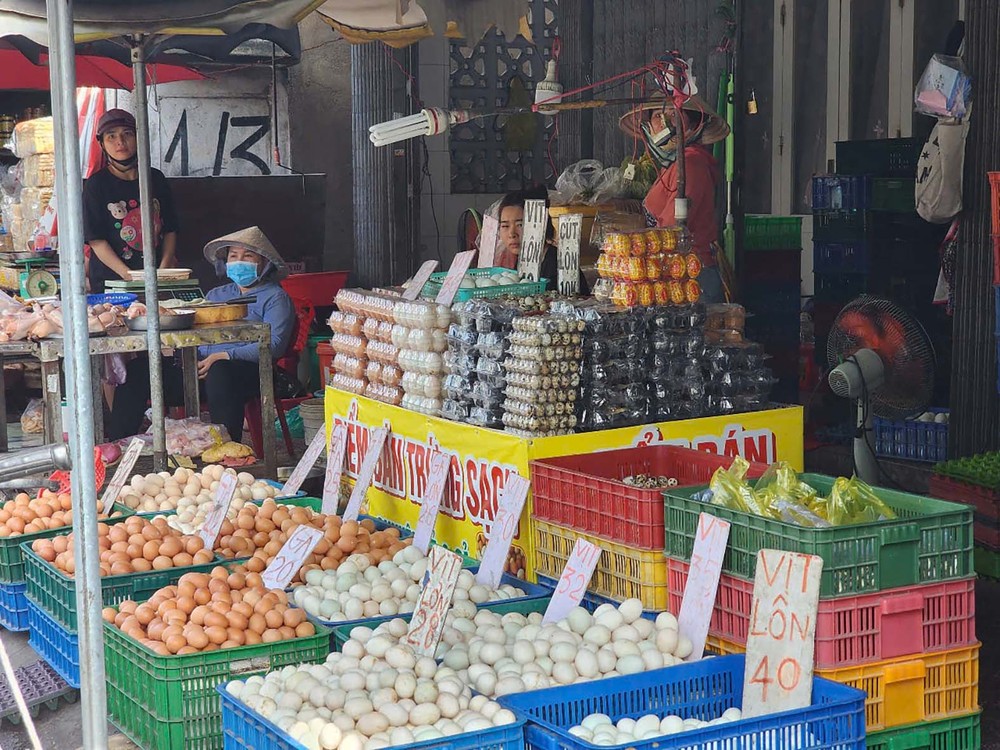While recent social media buzz about fake chicken eggs has been confirmed as a false rumor, many poultry farmers are still grappling with severe financial difficulties. They're struggling to stay afloat due to a sustained drop in egg prices and traders buying sparingly, leaving them in a precarious position despite the misinformation being debunked.

Yesterday, chicken egg stalls at Thach Da market on Pham Van Chieu Street in Ho Chi Minh City's Go Vap District were listing remarkably low prices, ranging from VND2,300-VND2,600 per egg. According to local traders, egg prices have seen a decrease of several hundred Vietnamese dong per egg over the past few months.
Similar trends are observed across other key traditional markets in the city. In Tan Binh, Tan Phu, and Binh Thanh districts, poultry egg prices have also fallen considerably compared to last month, now fluctuating between VND2,000-VND2,500 per egg.
Across many chicken farms, the atmosphere is grim as farmers face mounting financial losses. The owner of a laying hen farm in Gia Kiem Commune in Thong Nhat District of Dong Nai Province moaned that the spread of false rumors about counterfeit eggs has worsened an already difficult situation. Consumer fear has stalled the market, and traders have stopped buying. Egg prices have been depressed since before Tet 2025. He said that an egg is now being sold at only VND1,300–VND1,400 - far below the cost of production. Farmers certainly suffer big losses.
Tran Ngoc Ho, a poultry farmer in Dong Phu District of Binh Phuoc Province, despaired of the present price of eggs. He noted that current egg prices do not even cover basic expenses such as feed, labor, electricity, and water. Demand has slowed, and traders are buying in minimal quantities, leaving farmers in a dire situation.
Ho warned that if the trend continues, many farms may be forced to cull their flocks. His own family suffered losses of hundreds of millions of Vietnamese dong this May due to plummeting egg prices. The Southeast region, a key hub for livestock and poultry farming in Vietnam, has been hit hard.
In the first quarter of 2025 alone, farms and households in Dong Nai Province produced nearly 297 million eggs, with Binh Phuoc and Tay Ninh provinces each contributing hundreds of millions more. This region is a primary supplier of poultry eggs for the domestic market. Therefore, misinformation about fake eggs not only misleads consumers but also causes significant economic losses to farmers.
Addressing the recent spread of misinformation about fake eggs on social media, a representative from C.P. Vietnam Livestock Company noted that poultry egg prices have remained low for over a year, already placing significant financial strain on farmers. The circulation of false claims has further depressed prices, with a recent drop of several hundred Vietnamese dong per egg.
A spokesperson for Ba Huan Company, a leading poultry egg brand based in Ho Chi Minh City, also confirmed that misleading online content is negatively impacting the industry. According the Ba Huan Company representative, egg producers are facing fierce competition, and now with growing consumer skepticism, business conditions have become even more challenging.
Vu Manh Hung, Chairman of the Board at Hung Nhon Group, strongly refuted the fake egg rumors, asserting that there is no technology capable of manufacturing artificial eggs. Hung Nhon Group operates eight egg-laying farms across seven hectares, producing approximately 130 million eggs annually.
Chairman Vu Manh Hung emphasized the implausibility of counterfeit eggs, pointing out that real eggs currently retail for just over VND1,000 each. Echoing the stance of many poultry industry experts, Mr. Hung called on authorities to take swift action including investigating and strictly penalizing those who have spread misinformation about fake eggs in order to protect the livestock sector and restore consumer confidence.
























